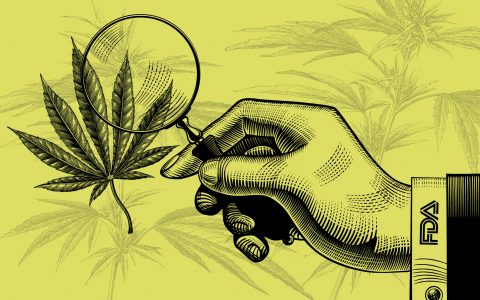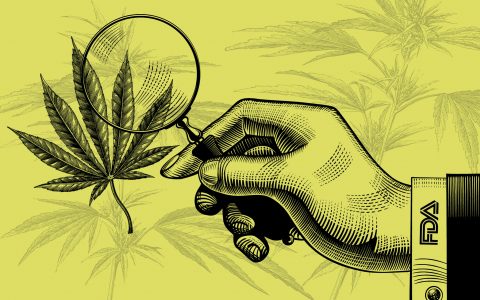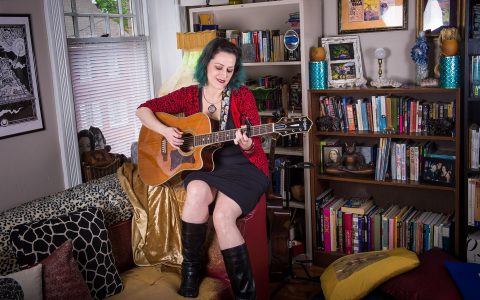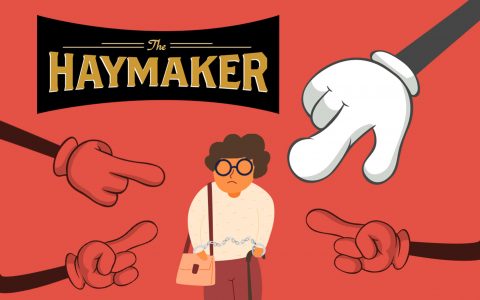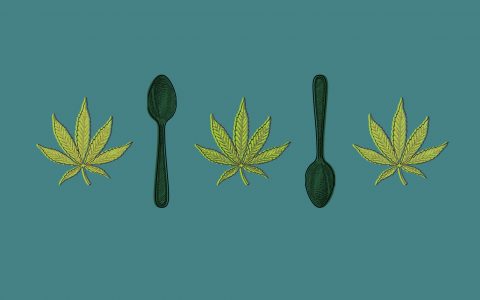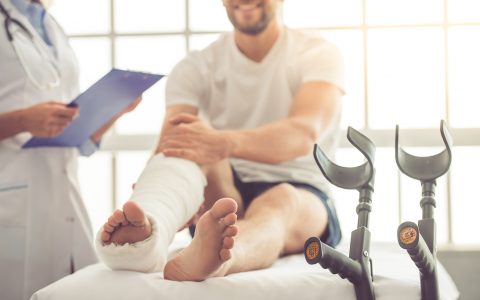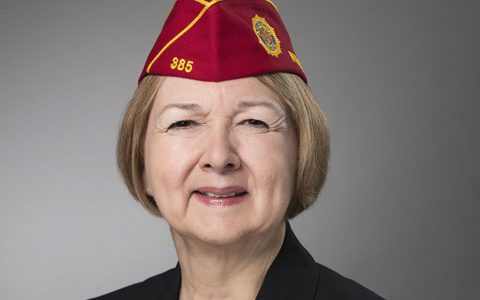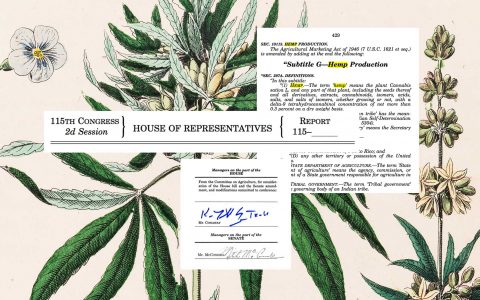VIROQUA, Wis. (AP) — In a tiny room inside a hair salon in Viroqua, Wisconsin, two women gaze over a glass case. They have driven 30-some miles down the Mississippi River from La Crosse just to check out Kickapoo Kind, a shop established last summer in the heart of the state’s politically liberal Driftless region.
On a Saturday morning, customers flow in and out of the shop, where a neon CBD sign glows in the window and a fan spreads the smell of cannabis as soon as you walk in the door.
A limping man in a neon green hoodie and jogger pants enters and sits in the salon’s waiting room. A girl in Star Wars lounge pants is greeted by her first name. A man in a camouflage jacket and a hat that reads “Craig’s Towing” comes in with his high school-aged daughter, sees the line and leaves. They come back 20 minutes later.
A man with a long gray beard and round eyeglasses shops with his son, who wears a pair of Converse and a flannel shirt.
They are all here for one thing.
Recently, the state of Wisconsin legalized the sale and use of CBD, or cannabidiol, an active ingredient in cannabis. The products contain just trace amounts or no THC, the psychoactive chemical found in the plant.
Marijuana remains illegal in Wisconsin, although Democratic Gov. Tony Evers has proposed legalizing its use for medical conditions and decriminalizing possession of small amounts. He has signaled he is open to legalization for recreational uses. However, top Republicans in the GOP-run Legislature have vowed to block Evers’ proposals.
Kickapoo Kind owner Tim Murphy said he has seen the popularity of cannabis blossom, including among some unlikely people. Customers come from many miles away to check out Murphy’s products. The shop recently moved to larger space on Main Street in Viroqua to handle the demand.
“I’ve had people come from Richland Center, Prairie du Chien, Elroy, all over,” Murphy said. “All walks of life. I’ve had 90-year-old grandmas in here, and I’ve had little babies (with epilepsy) in here. Every single walk of life that you can think of has walked through that door.”
In the United States, an estimated 40.9 million people used cannabis in 2017, and 22.2 million Americans 12 or over have used it in the past 30 days, according to the National Survey on Drug Abuse and Health.
In Wisconsin, an estimated 13 percent of all residents had used marijuana in 2013-14, according to a 2016 state Department of Health Services report. Cannabis was used in Wisconsin more often than any other illicit drug or painkiller. People of all races and ethnicities use cannabis, and over the past 30 years, U.S. residents have steadily become more accepting of it.
Waiting for Tides to Shift
Sitting inside Kickapoo Kind, his dreadlocks tucked under a stocking cap, is Keegan Murray-King, who has been using cannabis since he was 14. He became a regular consumer, although he occasionally takes breaks. He is now 26.
“The interest was using it as a way to have fun with friends at first, and then slowly it evolved into more of something I did for myself,” Murray-King said. He credits cannabis for helping him quit drinking alcohol, something he also says he started at a young age. “I quickly decided that I wanted to be involved with that plant, probably for the rest of my life.”
He moved to California to work on a cannabis farm. He soon realized he was not happy with the cannabis industry in California, which he said was not regulated enough. So he decided to return to Wisconsin and wait for the tides to shift.
About 13 miles south of Viroqua, near Rising Sun, Wisconsin, Murray-King farms vegetables. This year, he plans to begin growing hemp, which produces CBD, under the state’s new pilot program.
In 2013, Murray-King was arrested in Waushara County in central Wisconsin for possession of THC after being pulled over for an expired license plate. He was fined $400 and now has a misdemeanor drug offense on his record.
Another arrest would be a felony, and could eliminate Murray-King from participating in the hemp pilot program.
CBD Aids Rare Skin Disorder
Charlie Knuth was abandoned at birth. He was born with epidermolysis bullosa (EB), a genetic disease that leaves the skin covered in blisters and requires intensive, constant care.
Now 13, Charlie has had a home, a family and proper care since he was adopted at two weeks old. He is also one of Wisconsin’s many cannabis consumers.
Every morning when Charlie wakes up, he is a bloody mess. The bandages that wrap his blistering skin shifts while he sleeps, and wounds are exposed and reopened; his joints are often stiff with arthritis. He usually takes his time getting out of bed because it is such a painful process.
Every other day Charlie goes to school. On those days, Charlie feels anxious, because the fear of being knocked over or somehow injured by another student is so pressing. CBD, which he takes three times daily, eases his discomfort.
On the days he is not attending school, Charlie goes through the nearly two-hour process of replacing the bandages that cover large portions of his body. The room and tools must be disinfected and bandages cut to size. An entire, $200 jar of donated CBD cream is smeared on the bandages.
“He is a new child after his new bandages go on,” said his mother, Trisha Knuth. “The CBD cream helps his skin pain and joint pain tremendously.”
Because of the complications with his disease, Charlie is not able to use other painkillers for his symptoms.
The Knuth family first heard about using cannabis to treat Charlie’s condition on Facebook, when two different pro-cannabis groups offered her a free supply of “lab-tested, high quality products” for Charlie’s condition A few weeks ago, however, Trisha Knuth said the supply ended, and the nonprofit that supplies the cream said it could no longer send CBD to families.
“We’re just basically doing without it,” she said.
The Knuth family lives near Appleton, Wisconsin, an area that often lights up red on voting maps. Despite that, the Appleton Common Council voted unanimously in 2018 to support a resolution to push state government to legalize medicinal cannabis.
“Attitudes have changed,” Knuth said. “Minds have been opened.”
Education Changes Views on Cannabis
In La Crosse, Jessica Polacek has been busy re-enrolling in classes at the University of Wisconsin-La Crosse. The 52-year-old recently returned to school to earn her bachelor’s degree, but took a semester off to undergo gender confirmation surgery.
Before her venture back to school, Polacek said, she served 23 years in the U.S. Army, eventually being medically discharged in 2012 in part because of questioning her gender identity. She said she returned from Iraq with a back injury and post-traumatic stress disorder, and her recent surgery has caused them to flare up.
Polacek’s sister owns a shop in Illinois where she produces a CBD balm. Because of Illinois law, she refers to it as a “relief product.” Polacek decided to try it out.
“It takes a lot for me to say that because I was raised in a home where smoking marijuana was an everyday occurrence,” Polacek said. “It was also a place where I experienced much abuse.”
Polacek was born in Milwaukee and “moved around quite a bit,” graduating from high school in Merrill. At age 10, she started separating “weed from seed” for her dad and his friends. She attributed the abuse she endured to the cannabis, and became staunchly against it from then on out. “If drugs turned people into uncontrolled raging maniacs,” she thought, “then it had no place in society.”
After returning from Iraq, Polacek began researching the effects of medical cannabis on veterans and duty-related injuries and illnesses. Polacek began to use CBD in September.
What changed? For Polacek, it was learning more about the plant and its possibilities. She recently began work in the health care field. She had read about new research that the Veterans Administration was doing with veterans.
Education was the key to Polacek’s decision to use cannabis. The results for her have been great.
“Until we honestly take time to get educated, we will remain biased and closed off,” Polacek said. “Knowledge is the best tool for countering hatred, misunderstanding and prejudice.”
CBD Acceptance Grows in Rural Wisconsin
Back at Kickapoo Kind, Murphy is sitting down after about an hour of back-to-back customers. He is wearing an army-green T-shirt with the “ARMY” logo printed on it, only the “Y” is crossed out and an “F” has been drawn in at the beginning of the word — spelling FARM. Murphy and his wife, Noelle Kehoe, started Kickapoo Kind, partly to help local farmers.
“I thought that (hemp) farmers needed an outlet in this area, that would be where I could actually work with the farmers and sell straight to the consumer from the farmer,” Murphy said. Soon, Murphy will be teaming up with Murray-King to grow their own hemp for the shop.
Murphy has spent his entire life in the Driftless region of Wisconsin, and has been a cannabis user for around 30 years. He uses it medicinally for inflammation — he said it even helped him quit smoking cigarettes. And when it came time, he used it to treat his father, who had Parkinson’s disease.
Murphy said his dad grew up in the “reefer madness” generation when cannabis was considered a bad drug with no redeeming qualities.
“Even ’til the day my dad died, he was semi-against it, even though I started treating him (with CBD),” Murphy said. “It was actually helping. But even then he was like, ‘goddamn wacky-tobacky.’ ”
But perceptions are beginning to change, even if slowly. Murphy, who considers himself a part of the “alternative” crowd of Viroqua, said he has heard few criticisms since he began selling CBD and hemp from the hair salon.
“Really, I expected a little bit of pushback here and there, but I have not had any at all,” he said.
The nonprofit news outlet Wisconsin Watch provided this article to The Associated Press through a collaboration with Institute for Nonprofit News.


